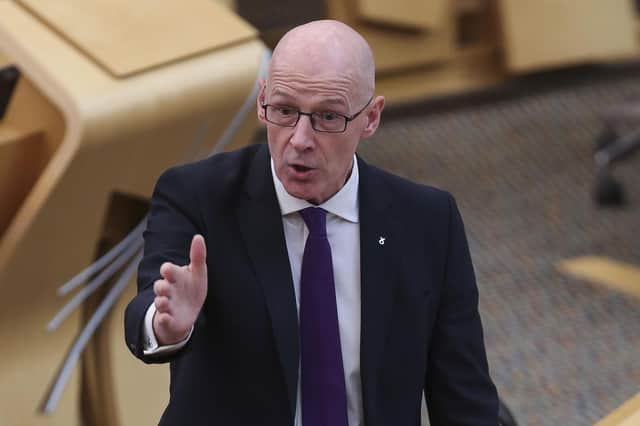Brian Monteith: After the Supreme Court children's rights debacle, how low will our politicians stoop?


If the conduct of our politicians is contemptuous of truth and democracy then our destination will be away from a civilised society; laws will be broken with impunity and without punishment, the most powerful will become stronger at the expense of the disadvantaged – and mayhem in the civic realm will ensue as services repeatedly fail and ultimately collapse.
I ask this question of political standards because a decision of the Supreme Court announced last week helped to answer it – but by the very nature of a thirty-three page judgment the full importance of what was decided unanimously by the five judges deliberating is unlikely to penetrate the public consciousness. Communicating the outcome effectively would in usual circumstances be challenging – communicating it when one party is given to misrepresenting the outcome, what I might describe as “laying smoke”, is doubly so.
Advertisement
Hide AdAdvertisement
Hide AdI write of course about the two Bills passed by the Scottish Parliament before this May’s Holyrood election referred to the Supreme Court by the UK Government on grounds that four clauses in an SNP Government Bill protecting the rights of children and two clauses in a private bill by Andy Wightman, but supported by the SNP Government, on rights to democratic local government went beyond the powers of Holyrood.
The Convention on the Rights of the Child was drawn up by the United Nations and the Charter on Local Government came from the Council of Europe (which, unlike the EU, we remain members of). Both were Treaties signed up to by the UK Government and both treaties enjoyed cross party support in Westminster and Holyrood. There is no party, no Government nor any parliament opposing protections of the rights outlined in the treaties.
Politics is hard enough – it is a battle of competing ideas, with great egos and vested interests advocating or opposing change – that when political leaders find they have the opportunity to advance the rights of children and of local democracy in a spirit of consensus and harmony at a time when the country is so bitterly divided on many other issues – it should be grabbed firmly with both hands.
But not this SNP government of Nicola Sturgeon and all her ministers. John Swinney in particular took a conscious decision to press ahead with his bill despite an open letter on 4 March warning his Bill was flawed.
It should be remembered in 2014 over 3.6M Scottish people voted in the SNP’s referendum seeking to end devolution and secede from the UK – the largest democratic exercise in our history – and they decided against it. The Scottish Government has no mandate to surreptitiously obtain powers at Holyrood over Westminster.
Nicola Sturgeon’s Government refused to listen because she would either get away with the Bills being passed and not struck down by the Supreme Court – thus extending her powers against popular will – or have them struck down and be able to claim “Westminster” was limiting her powers and fomenting a grievance for to campaign with.
The UK Government referred the Scottish Government Bills to the Supreme Court because it believed the six clauses it questioned went beyond the legal powers of Scotland Act. The practical effect of the Bills would be to give powers of veto to SNP ministers over what the UK Government may choose to act in the future. In short, the SNP saw the bills as a chance for a power-grab.
There are some checks in the parliamentary process to prevent overreach by Holyrood explained in Lord Reed’s judgement. The first “requires that the person in charge of the Bill must make a statement that in his view the provisions of the Bill would be within the legislative competence of the Scottish Parliament. The Scottish Ministerial Code requires that, in the case of a Government Bill, the statement by the sponsoring Minister to that effect will have been cleared by the Law Officers.”
Advertisement
Hide AdAdvertisement
Hide AdSecondly, “the Presiding Officer of the Scottish Parliament must decide whether or not in his view the provisions of the Bill would be within the legislative competence of the Scottish Parliament, and state his decision. An adverse decision by the Presiding Officer does not prevent the Bill from being introduced, but it is an important signal to the Scottish Parliament, and to the Law Officers of both the Scottish and the UK Governments, and may influence their decision whether, in due course, to make a reference to this court.”
In the case of the local government Bill it was presented as a Member’s Bill by Andy Wightman and for the Scottish Government’s Children’s Bill it was John Swinney, with Ken McIntosh being Presiding Officer for both. Wightman and McIntosh have left the Parliament. All of them attested they believed the Bills were competent, in the case of John Swinney and Ken Macintosh they would have had their own legal advice. It should be published forthwith.
Andy Wightman’s Bill would not have passed without SNP Government support and was drafted for him. He would have been advised its approach was competent. John Swinney is a different matter – he was advised by the UK Government of its flaws and still chose to proceed. When politicians seek to defend their actions by shielding behind children's interests but in fact are delaying the protection of children’s rights we know how low they will go to get their way. John Swinney is still a Minister. Resignation is the only honourable thing to do in the circumstances.
Brian Monteith is editor of ThinkScotland.org and previously served in the Scottish and European Parliaments for the Conservative and Brexit Parties respectively.
Comments
Want to join the conversation? Please or to comment on this article.